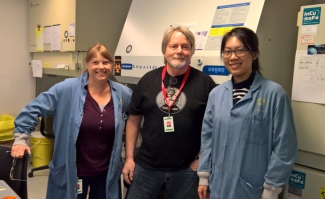Canadian Blood Services discovery research lab contributes to new knowledge on neutrophils
Thursday, August 29, 2024 Abby Wolfe
Dr. Donald R. Branch’s work as a discovery scientist at Canadian Blood Services focuses on immunotherapy, seeking to further enhance understanding of the cellular and molecular mechanisms involved in autoimmune diseases. Based in Toronto, Dr. Branch’s laboratory develops models of rheumatoid arthritis, Alzheimer’s disease, immune thrombocytopenia (ITP) and multiple sclerosis in mice. These models are particularly useful in examining how cells affected by these conditions respond to current therapeutic agents like intravenous immunoglobulin – a blood product made from human plasma commonly known as IVIg – and investigating potential alternative therapeutics.
Over the years, Dr. Branch’s lab research findings have included the discovery of a special reagent that makes identification of antibodies easier by “zapping" autoantibodies, answers around unexpected side effects of IVIg therapy, and insights around recipients’ responses to bone marrow transplantation. It has also earned him numerous awards and accolades, including four from AABB, the Association for the Advancement of Blood & Biotherapies.

New knowledge about neutrophils
Recently, contributions from Dr. Branch’s lab helped a U.K.-based team of researchers discover new information about how neutrophil function and activity is regulated. Neutrophils are a type of white blood cell that are part of the body’s normal immune response. A person’s neutrophil levels may be affected by infections as well as chronic or acute illnesses. Patients who have very low neutrophil counts and/or persistent infections may receive a boost to their neutrophil levels via granulocyte transfusion therapy. However, in some diseases, overactivation of neutrophils can also create an inflammatory environment and harm healthy tissue.
The research has been published in the high-impact scientific journal, Nature. This publication has filled a gap in knowledge about the mechanisms involved in maintaining balance between neutrophils’ infection-fighting power and inflammation-causing potential. As Dr. Branch describes: “This research by Dr. Brown and team shows that the myeloid inhibitory C-type lectin enzyme, which is known as MICL, controls neutrophil activity in rheumatoid arthritis. It is likely that MICL also regulates neutrophil activity in general. This suggests that if therapeutics can be designed to target MICL, they may be useful in controlling inflammation and infection. It is a fundamental finding that will change our understanding of the biology of neutrophils.”
Discovery research, like the study to which Don and Ruqayyah contributed, is essential to improving patient care in the long run. New biomedical insights are essential to crafting new drugs and new therapeutic approaches in a rational way.
Dr. William (Bill) Sheffield, Canadian Blood Services senior scientist and associate director of research
Discovery research expertise leads to new collaboration
The special mouse model that Dr. Branch’s lab uses is known as K/BxN. In this model, two mouse populations are selectively bred to produce offspring whose genetic material carry an antibody that destroys bone cartilage. An arthritis-causing serum containing this destructive antibody can then be obtained from the mice for use as a reagent in research. This process is termed “serum-transfer arthritis” and has been used by many investigators in the study of treatments that may alleviate the condition.
Knowledge of Dr. Branch’s lab’s expertise in this area prompted a connection to the team of researchers at the Universities of Exeter and Aberdeen in the U.K. for this study. Says Dr. Branch, “In 2021, I supported a successful application to Canadian Blood Services’ Blood Efficiency Accelerator Program (BEAP) by Dr. Maria Fernandes, a researcher from Héma-Québec who works with neutrophils. Through this collaboration, Dr. Fernandes was aware that I work on rheumatoid arthritis with K/BxN mice, and she also knew that Dr. Gordon Brown in the U.K. was looking to collaborate with a researcher in this area for some planned neutrophil research. My lab, which included postdoctoral fellow Dr. Ruqayyah Almizraq at the time, contributed to Dr. Brown’s research by providing the sera from our K/BxN mice. With this sera, Dr. Brown and his collaborators were able to induce rheumatoid arthritis and show that it could be resolved by removing the inhibition of a specific enzyme.”
Science that is never boring
The Branch lab is currently using these same mouse models to investigate whether a recombinant protein called IgG1 Fc hexamer could be an effective replacement for IVIg in the treatment of autoimmune conditions like rheumatoid arthritis and ITP. While early results are promising, continued work is needed. In fact, back in 2018, Dr. Branch was asked in a previous R.E.D. blog post to describe what he found to be the most exciting part of science. Reflecting on the same question now, he reiterates that his response still rings true after 50 years in the field:
The most exciting part of science is that when you do good science, you get more questions than you get answers, which means it is never boring. There is no end to imagination; new ideas, theories, experiments and discoveries occur often and provide a level of excitement to which many other professions cannot attest.
Dr. Donald (Don) Branch, Canadian Blood Services senior scientist
Canadian Blood Services – Driving world-class innovation
Through discovery, development and applied research, Canadian Blood Services drives world-class innovation in blood transfusion, cellular therapy and transplantation—bringing clarity and insight to an increasingly complex healthcare future. Our dedicated research team and extended network of partners engage in exploratory and applied research to create new knowledge, inform and enhance best practices, contribute to the development of new services and technologies, and build capacity through training and collaboration. Find out more about our research impact.
The opinions reflected in this post are those of the author and do not necessarily reflect the opinions of Canadian Blood Services nor do they reflect the views of Health Canada or any other funding agency.
Related blog posts
Dr. Donald Branch, Canadian Blood Services senior scientist, has received the Dale A. Smith Memorial Award for his discovery of the ZZAP reagent. This award, from the Association for the Advancement of Blood & Biotherapies (AABB), recognizes the application of technology to the practice of transfusion medicine or biotherapies.
Students from the Undergraduate Pathology Alliance at Western University posed insightful questions to researchers during an interactive visit to the research laboratory of Dr. Donald Branch, Canadian Blood Services senior scientist in February 2023.
For this instalment of “Meet the researcher”, we met with Dr. Donald Branch, a scientist at Canadian Blood Services who studies infectious diseases and immunology. How long have you been with Canadian Blood Services? I started with the Canadian Red Cross at the Edmonton Blood Centre in December 1985...


